Leadership: Changing Perspectives and Responsible Leadership Report
VerifiedAdded on 2023/01/13
|10
|3125
|69
Report
AI Summary
This report delves into the multifaceted realm of leadership, examining its evolving perspectives across economic, social, and political contexts. It analyzes the challenges leaders face in today's volatile business environment, drawing insights from various countries like China, Spain, Singapore, India, Egypt, the UK, and the US. The report highlights the characteristics of responsible leadership, emphasizing traits such as reliance, convincing skills, and ethical standards. Furthermore, it underscores the importance of demonstrating leadership during change processes, emphasizing communication, commitment, and care as crucial elements. The report concludes by stressing the role of leadership in clarifying vision, inspiring others, and developing employees, ultimately aiding in effective change management within organizations. The report is contributed by a student to be published on the website Desklib.
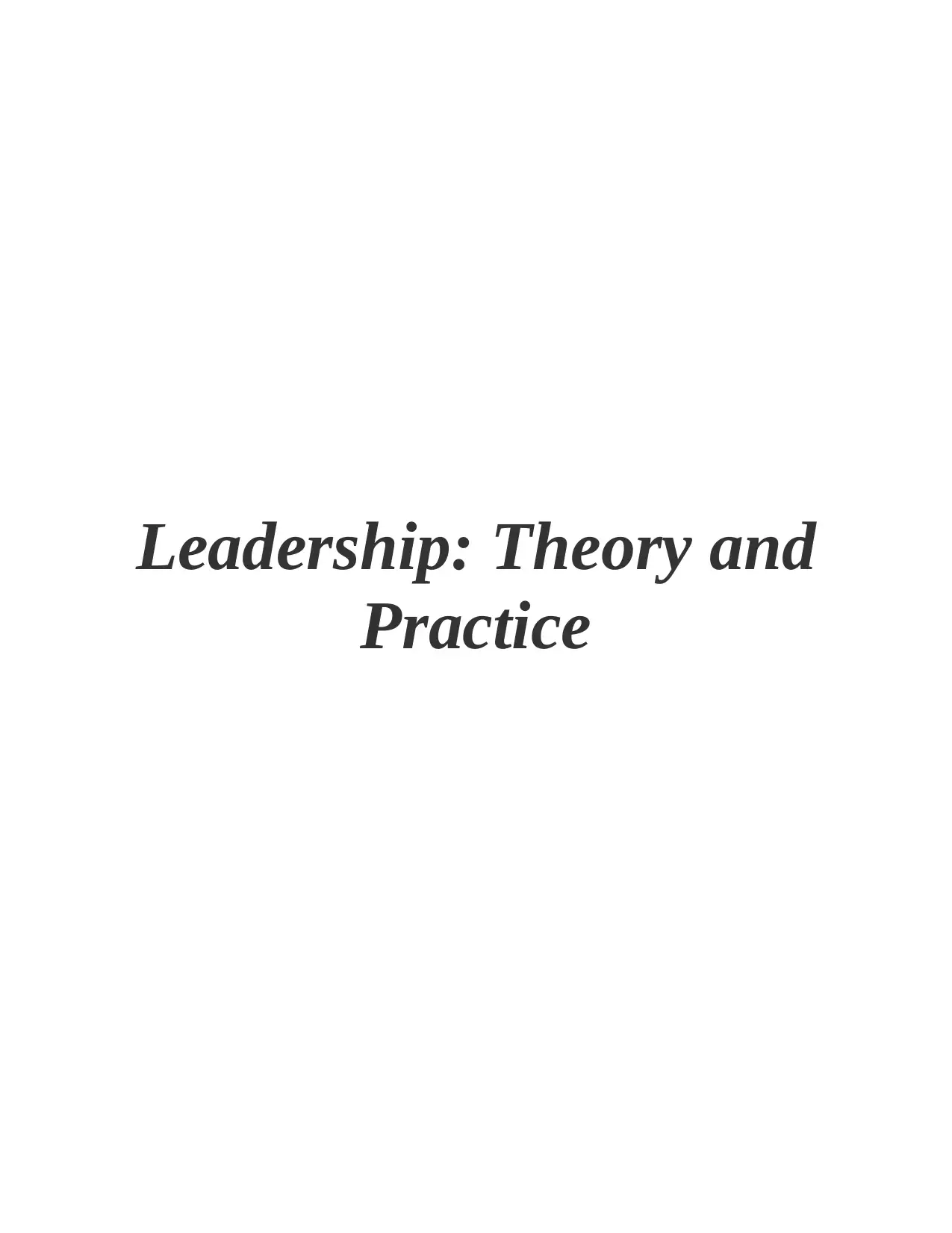
Leadership: Theory and
Practice
Practice
Paraphrase This Document
Need a fresh take? Get an instant paraphrase of this document with our AI Paraphraser
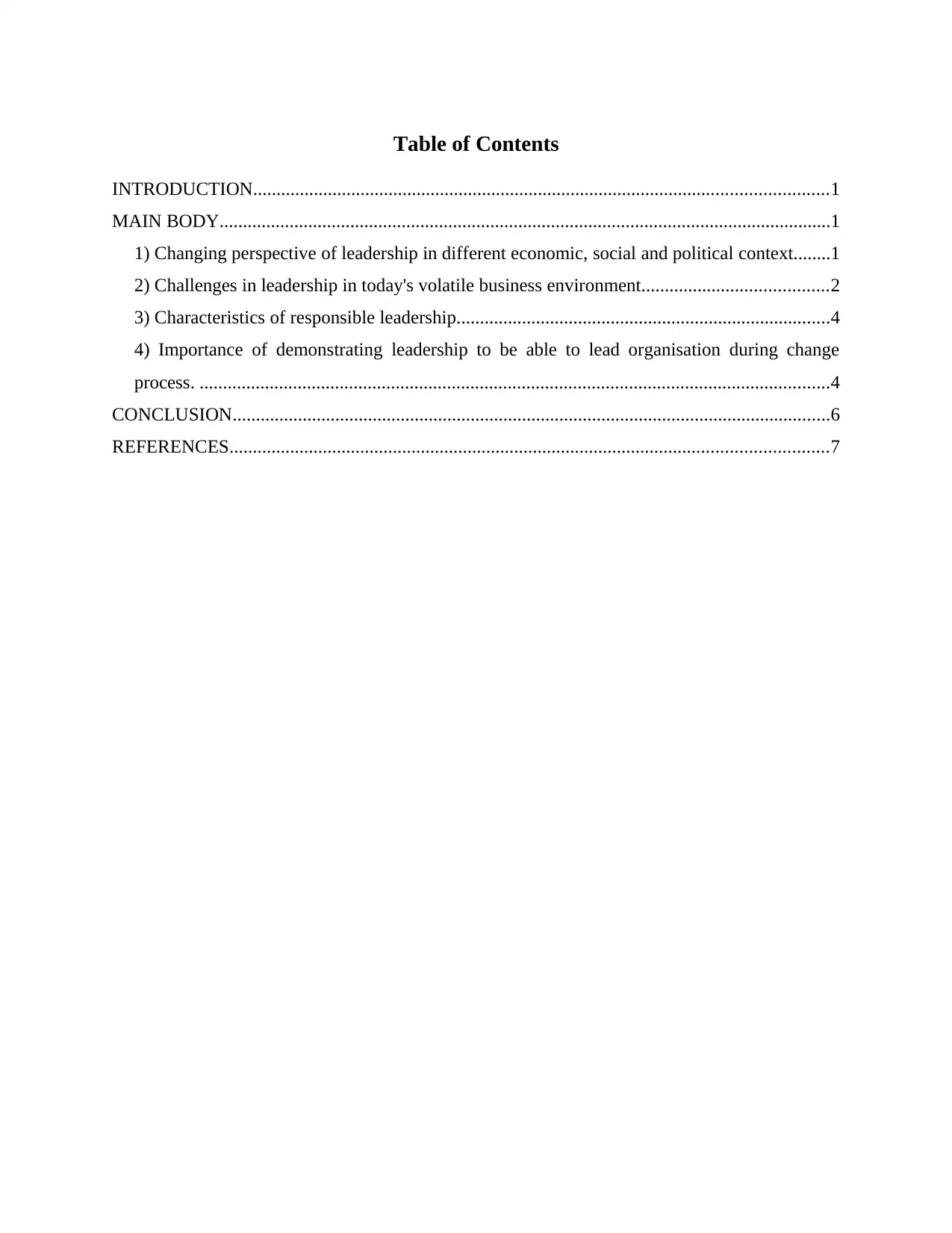
Table of Contents
INTRODUCTION...........................................................................................................................1
MAIN BODY...................................................................................................................................1
1) Changing perspective of leadership in different economic, social and political context........1
2) Challenges in leadership in today's volatile business environment........................................2
3) Characteristics of responsible leadership................................................................................4
4) Importance of demonstrating leadership to be able to lead organisation during change
process. .......................................................................................................................................4
CONCLUSION................................................................................................................................6
REFERENCES................................................................................................................................7
INTRODUCTION...........................................................................................................................1
MAIN BODY...................................................................................................................................1
1) Changing perspective of leadership in different economic, social and political context........1
2) Challenges in leadership in today's volatile business environment........................................2
3) Characteristics of responsible leadership................................................................................4
4) Importance of demonstrating leadership to be able to lead organisation during change
process. .......................................................................................................................................4
CONCLUSION................................................................................................................................6
REFERENCES................................................................................................................................7
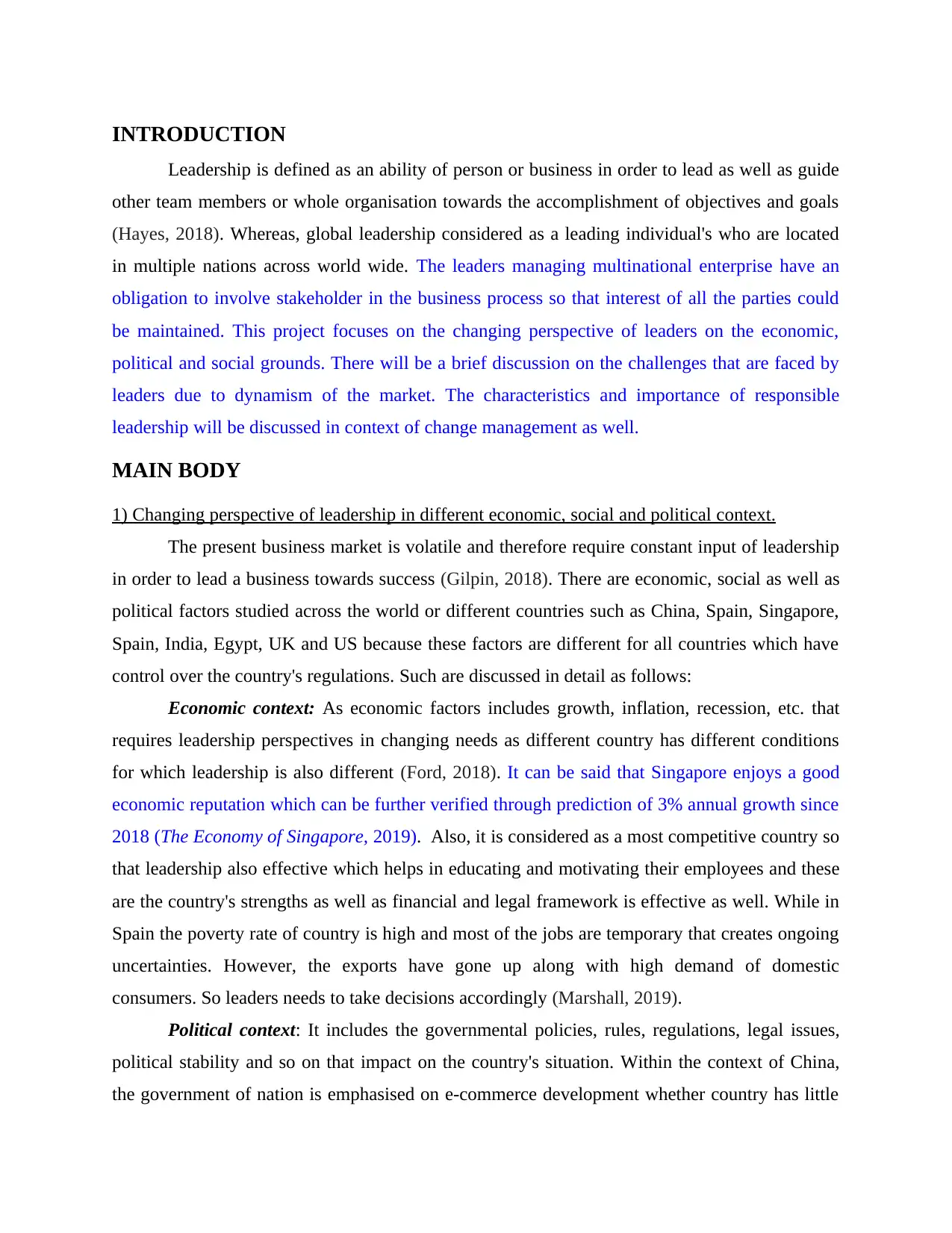
INTRODUCTION
Leadership is defined as an ability of person or business in order to lead as well as guide
other team members or whole organisation towards the accomplishment of objectives and goals
(Hayes, 2018). Whereas, global leadership considered as a leading individual's who are located
in multiple nations across world wide. The leaders managing multinational enterprise have an
obligation to involve stakeholder in the business process so that interest of all the parties could
be maintained. This project focuses on the changing perspective of leaders on the economic,
political and social grounds. There will be a brief discussion on the challenges that are faced by
leaders due to dynamism of the market. The characteristics and importance of responsible
leadership will be discussed in context of change management as well.
MAIN BODY
1) Changing perspective of leadership in different economic, social and political context.
The present business market is volatile and therefore require constant input of leadership
in order to lead a business towards success (Gilpin, 2018). There are economic, social as well as
political factors studied across the world or different countries such as China, Spain, Singapore,
Spain, India, Egypt, UK and US because these factors are different for all countries which have
control over the country's regulations. Such are discussed in detail as follows:
Economic context: As economic factors includes growth, inflation, recession, etc. that
requires leadership perspectives in changing needs as different country has different conditions
for which leadership is also different (Ford, 2018). It can be said that Singapore enjoys a good
economic reputation which can be further verified through prediction of 3% annual growth since
2018 (The Economy of Singapore, 2019). Also, it is considered as a most competitive country so
that leadership also effective which helps in educating and motivating their employees and these
are the country's strengths as well as financial and legal framework is effective as well. While in
Spain the poverty rate of country is high and most of the jobs are temporary that creates ongoing
uncertainties. However, the exports have gone up along with high demand of domestic
consumers. So leaders needs to take decisions accordingly (Marshall, 2019).
Political context: It includes the governmental policies, rules, regulations, legal issues,
political stability and so on that impact on the country's situation. Within the context of China,
the government of nation is emphasised on e-commerce development whether country has little
Leadership is defined as an ability of person or business in order to lead as well as guide
other team members or whole organisation towards the accomplishment of objectives and goals
(Hayes, 2018). Whereas, global leadership considered as a leading individual's who are located
in multiple nations across world wide. The leaders managing multinational enterprise have an
obligation to involve stakeholder in the business process so that interest of all the parties could
be maintained. This project focuses on the changing perspective of leaders on the economic,
political and social grounds. There will be a brief discussion on the challenges that are faced by
leaders due to dynamism of the market. The characteristics and importance of responsible
leadership will be discussed in context of change management as well.
MAIN BODY
1) Changing perspective of leadership in different economic, social and political context.
The present business market is volatile and therefore require constant input of leadership
in order to lead a business towards success (Gilpin, 2018). There are economic, social as well as
political factors studied across the world or different countries such as China, Spain, Singapore,
Spain, India, Egypt, UK and US because these factors are different for all countries which have
control over the country's regulations. Such are discussed in detail as follows:
Economic context: As economic factors includes growth, inflation, recession, etc. that
requires leadership perspectives in changing needs as different country has different conditions
for which leadership is also different (Ford, 2018). It can be said that Singapore enjoys a good
economic reputation which can be further verified through prediction of 3% annual growth since
2018 (The Economy of Singapore, 2019). Also, it is considered as a most competitive country so
that leadership also effective which helps in educating and motivating their employees and these
are the country's strengths as well as financial and legal framework is effective as well. While in
Spain the poverty rate of country is high and most of the jobs are temporary that creates ongoing
uncertainties. However, the exports have gone up along with high demand of domestic
consumers. So leaders needs to take decisions accordingly (Marshall, 2019).
Political context: It includes the governmental policies, rules, regulations, legal issues,
political stability and so on that impact on the country's situation. Within the context of China,
the government of nation is emphasised on e-commerce development whether country has little
⊘ This is a preview!⊘
Do you want full access?
Subscribe today to unlock all pages.

Trusted by 1+ million students worldwide
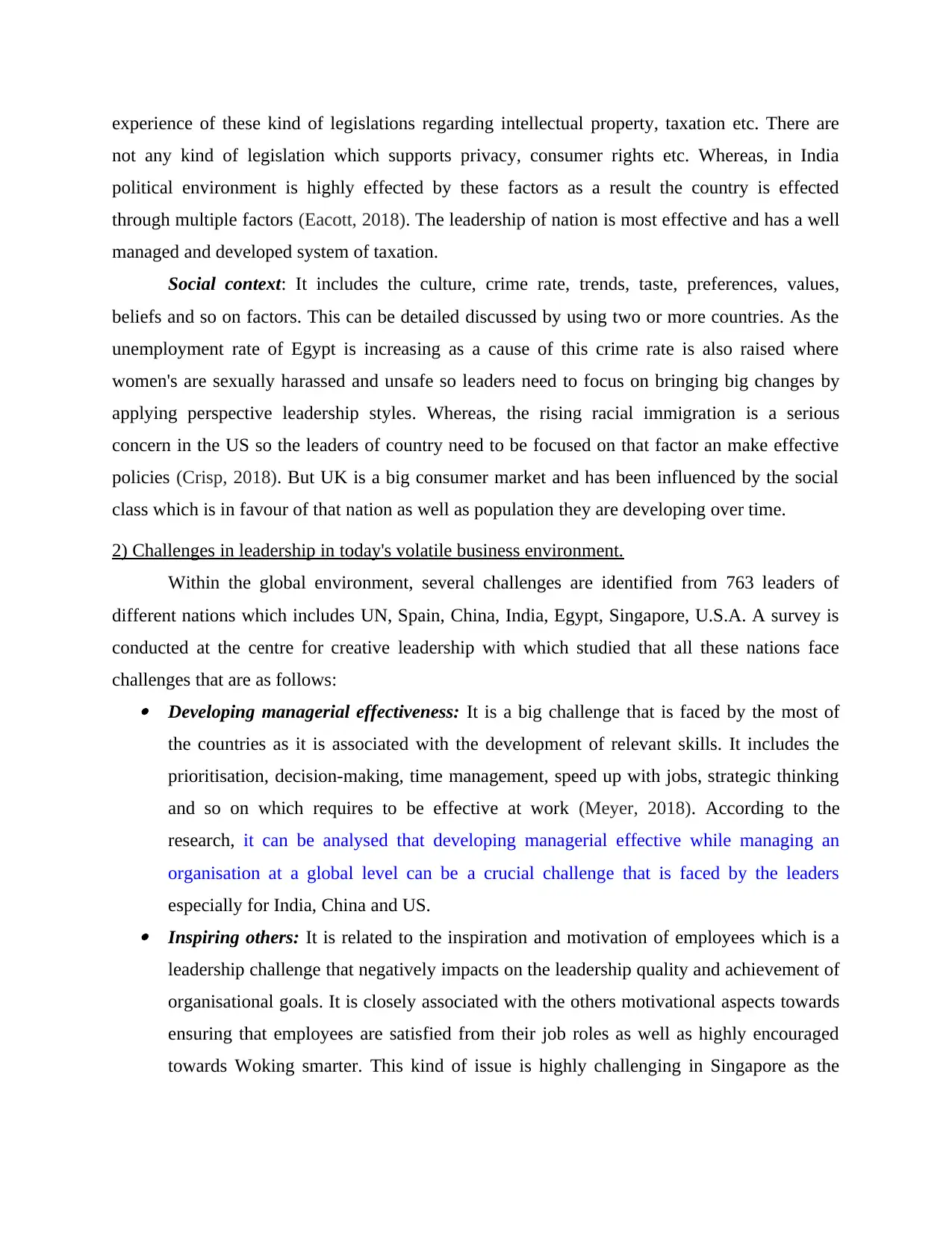
experience of these kind of legislations regarding intellectual property, taxation etc. There are
not any kind of legislation which supports privacy, consumer rights etc. Whereas, in India
political environment is highly effected by these factors as a result the country is effected
through multiple factors (Eacott, 2018). The leadership of nation is most effective and has a well
managed and developed system of taxation.
Social context: It includes the culture, crime rate, trends, taste, preferences, values,
beliefs and so on factors. This can be detailed discussed by using two or more countries. As the
unemployment rate of Egypt is increasing as a cause of this crime rate is also raised where
women's are sexually harassed and unsafe so leaders need to focus on bringing big changes by
applying perspective leadership styles. Whereas, the rising racial immigration is a serious
concern in the US so the leaders of country need to be focused on that factor an make effective
policies (Crisp, 2018). But UK is a big consumer market and has been influenced by the social
class which is in favour of that nation as well as population they are developing over time.
2) Challenges in leadership in today's volatile business environment.
Within the global environment, several challenges are identified from 763 leaders of
different nations which includes UN, Spain, China, India, Egypt, Singapore, U.S.A. A survey is
conducted at the centre for creative leadership with which studied that all these nations face
challenges that are as follows: Developing managerial effectiveness: It is a big challenge that is faced by the most of
the countries as it is associated with the development of relevant skills. It includes the
prioritisation, decision-making, time management, speed up with jobs, strategic thinking
and so on which requires to be effective at work (Meyer, 2018). According to the
research, it can be analysed that developing managerial effective while managing an
organisation at a global level can be a crucial challenge that is faced by the leaders
especially for India, China and US. Inspiring others: It is related to the inspiration and motivation of employees which is a
leadership challenge that negatively impacts on the leadership quality and achievement of
organisational goals. It is closely associated with the others motivational aspects towards
ensuring that employees are satisfied from their job roles as well as highly encouraged
towards Woking smarter. This kind of issue is highly challenging in Singapore as the
not any kind of legislation which supports privacy, consumer rights etc. Whereas, in India
political environment is highly effected by these factors as a result the country is effected
through multiple factors (Eacott, 2018). The leadership of nation is most effective and has a well
managed and developed system of taxation.
Social context: It includes the culture, crime rate, trends, taste, preferences, values,
beliefs and so on factors. This can be detailed discussed by using two or more countries. As the
unemployment rate of Egypt is increasing as a cause of this crime rate is also raised where
women's are sexually harassed and unsafe so leaders need to focus on bringing big changes by
applying perspective leadership styles. Whereas, the rising racial immigration is a serious
concern in the US so the leaders of country need to be focused on that factor an make effective
policies (Crisp, 2018). But UK is a big consumer market and has been influenced by the social
class which is in favour of that nation as well as population they are developing over time.
2) Challenges in leadership in today's volatile business environment.
Within the global environment, several challenges are identified from 763 leaders of
different nations which includes UN, Spain, China, India, Egypt, Singapore, U.S.A. A survey is
conducted at the centre for creative leadership with which studied that all these nations face
challenges that are as follows: Developing managerial effectiveness: It is a big challenge that is faced by the most of
the countries as it is associated with the development of relevant skills. It includes the
prioritisation, decision-making, time management, speed up with jobs, strategic thinking
and so on which requires to be effective at work (Meyer, 2018). According to the
research, it can be analysed that developing managerial effective while managing an
organisation at a global level can be a crucial challenge that is faced by the leaders
especially for India, China and US. Inspiring others: It is related to the inspiration and motivation of employees which is a
leadership challenge that negatively impacts on the leadership quality and achievement of
organisational goals. It is closely associated with the others motivational aspects towards
ensuring that employees are satisfied from their job roles as well as highly encouraged
towards Woking smarter. This kind of issue is highly challenging in Singapore as the
Paraphrase This Document
Need a fresh take? Get an instant paraphrase of this document with our AI Paraphraser
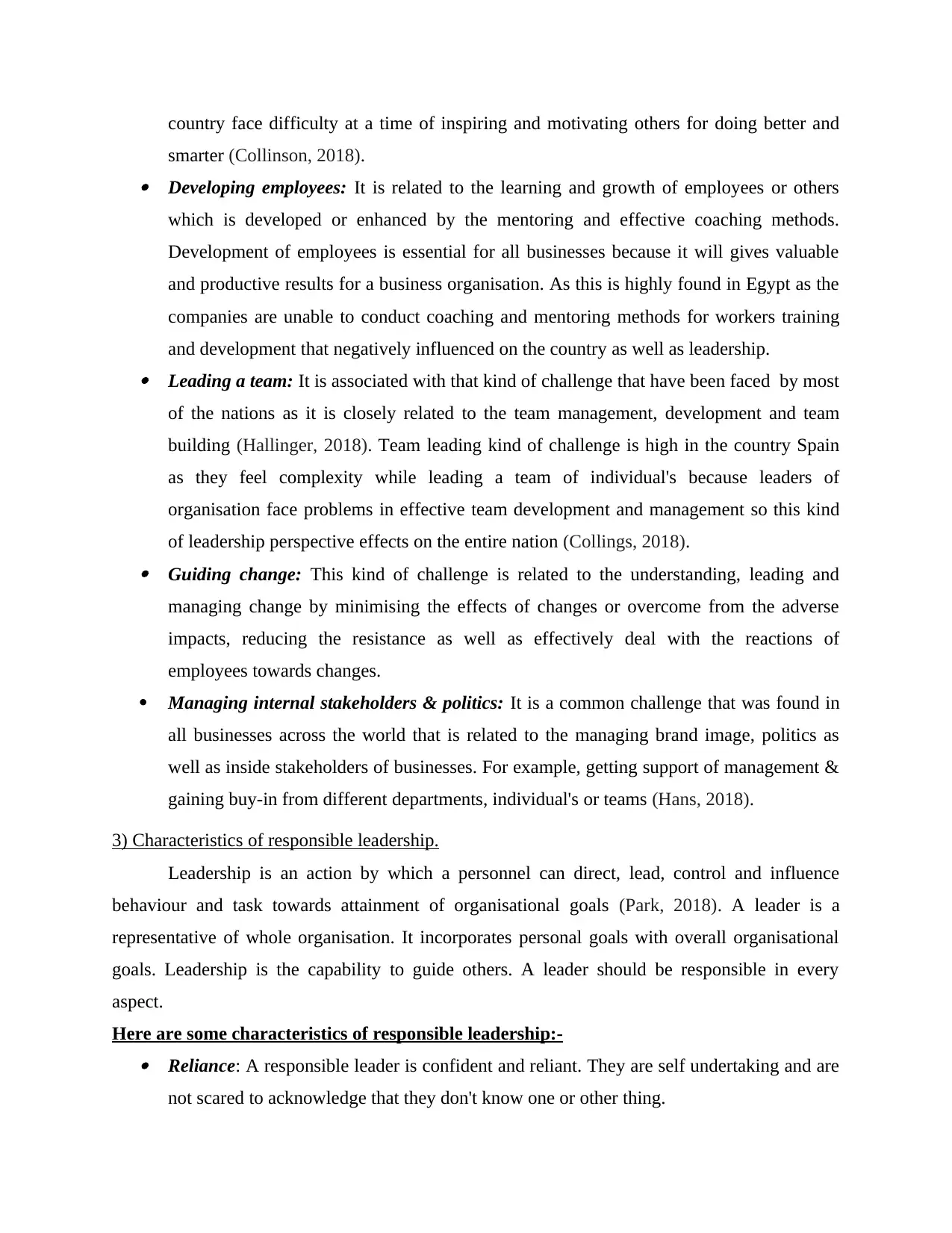
country face difficulty at a time of inspiring and motivating others for doing better and
smarter (Collinson, 2018). Developing employees: It is related to the learning and growth of employees or others
which is developed or enhanced by the mentoring and effective coaching methods.
Development of employees is essential for all businesses because it will gives valuable
and productive results for a business organisation. As this is highly found in Egypt as the
companies are unable to conduct coaching and mentoring methods for workers training
and development that negatively influenced on the country as well as leadership. Leading a team: It is associated with that kind of challenge that have been faced by most
of the nations as it is closely related to the team management, development and team
building (Hallinger, 2018). Team leading kind of challenge is high in the country Spain
as they feel complexity while leading a team of individual's because leaders of
organisation face problems in effective team development and management so this kind
of leadership perspective effects on the entire nation (Collings, 2018). Guiding change: This kind of challenge is related to the understanding, leading and
managing change by minimising the effects of changes or overcome from the adverse
impacts, reducing the resistance as well as effectively deal with the reactions of
employees towards changes.
Managing internal stakeholders & politics: It is a common challenge that was found in
all businesses across the world that is related to the managing brand image, politics as
well as inside stakeholders of businesses. For example, getting support of management &
gaining buy-in from different departments, individual's or teams (Hans, 2018).
3) Characteristics of responsible leadership.
Leadership is an action by which a personnel can direct, lead, control and influence
behaviour and task towards attainment of organisational goals (Park, 2018). A leader is a
representative of whole organisation. It incorporates personal goals with overall organisational
goals. Leadership is the capability to guide others. A leader should be responsible in every
aspect.
Here are some characteristics of responsible leadership:- Reliance: A responsible leader is confident and reliant. They are self undertaking and are
not scared to acknowledge that they don't know one or other thing.
smarter (Collinson, 2018). Developing employees: It is related to the learning and growth of employees or others
which is developed or enhanced by the mentoring and effective coaching methods.
Development of employees is essential for all businesses because it will gives valuable
and productive results for a business organisation. As this is highly found in Egypt as the
companies are unable to conduct coaching and mentoring methods for workers training
and development that negatively influenced on the country as well as leadership. Leading a team: It is associated with that kind of challenge that have been faced by most
of the nations as it is closely related to the team management, development and team
building (Hallinger, 2018). Team leading kind of challenge is high in the country Spain
as they feel complexity while leading a team of individual's because leaders of
organisation face problems in effective team development and management so this kind
of leadership perspective effects on the entire nation (Collings, 2018). Guiding change: This kind of challenge is related to the understanding, leading and
managing change by minimising the effects of changes or overcome from the adverse
impacts, reducing the resistance as well as effectively deal with the reactions of
employees towards changes.
Managing internal stakeholders & politics: It is a common challenge that was found in
all businesses across the world that is related to the managing brand image, politics as
well as inside stakeholders of businesses. For example, getting support of management &
gaining buy-in from different departments, individual's or teams (Hans, 2018).
3) Characteristics of responsible leadership.
Leadership is an action by which a personnel can direct, lead, control and influence
behaviour and task towards attainment of organisational goals (Park, 2018). A leader is a
representative of whole organisation. It incorporates personal goals with overall organisational
goals. Leadership is the capability to guide others. A leader should be responsible in every
aspect.
Here are some characteristics of responsible leadership:- Reliance: A responsible leader is confident and reliant. They are self undertaking and are
not scared to acknowledge that they don't know one or other thing.
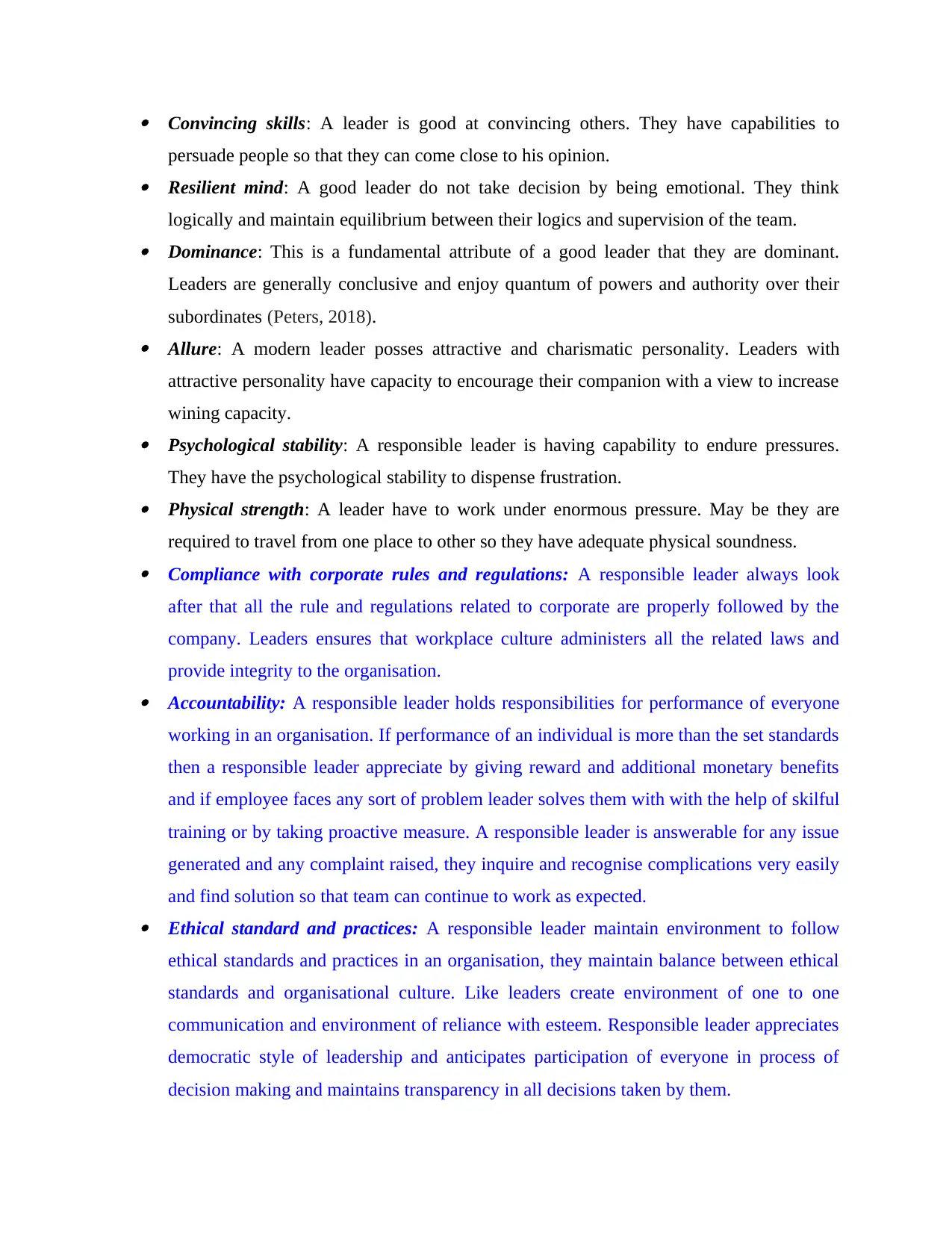
Convincing skills: A leader is good at convincing others. They have capabilities to
persuade people so that they can come close to his opinion. Resilient mind: A good leader do not take decision by being emotional. They think
logically and maintain equilibrium between their logics and supervision of the team. Dominance: This is a fundamental attribute of a good leader that they are dominant.
Leaders are generally conclusive and enjoy quantum of powers and authority over their
subordinates (Peters, 2018). Allure: A modern leader posses attractive and charismatic personality. Leaders with
attractive personality have capacity to encourage their companion with a view to increase
wining capacity. Psychological stability: A responsible leader is having capability to endure pressures.
They have the psychological stability to dispense frustration. Physical strength: A leader have to work under enormous pressure. May be they are
required to travel from one place to other so they have adequate physical soundness. Compliance with corporate rules and regulations: A responsible leader always look
after that all the rule and regulations related to corporate are properly followed by the
company. Leaders ensures that workplace culture administers all the related laws and
provide integrity to the organisation. Accountability: A responsible leader holds responsibilities for performance of everyone
working in an organisation. If performance of an individual is more than the set standards
then a responsible leader appreciate by giving reward and additional monetary benefits
and if employee faces any sort of problem leader solves them with with the help of skilful
training or by taking proactive measure. A responsible leader is answerable for any issue
generated and any complaint raised, they inquire and recognise complications very easily
and find solution so that team can continue to work as expected. Ethical standard and practices: A responsible leader maintain environment to follow
ethical standards and practices in an organisation, they maintain balance between ethical
standards and organisational culture. Like leaders create environment of one to one
communication and environment of reliance with esteem. Responsible leader appreciates
democratic style of leadership and anticipates participation of everyone in process of
decision making and maintains transparency in all decisions taken by them.
persuade people so that they can come close to his opinion. Resilient mind: A good leader do not take decision by being emotional. They think
logically and maintain equilibrium between their logics and supervision of the team. Dominance: This is a fundamental attribute of a good leader that they are dominant.
Leaders are generally conclusive and enjoy quantum of powers and authority over their
subordinates (Peters, 2018). Allure: A modern leader posses attractive and charismatic personality. Leaders with
attractive personality have capacity to encourage their companion with a view to increase
wining capacity. Psychological stability: A responsible leader is having capability to endure pressures.
They have the psychological stability to dispense frustration. Physical strength: A leader have to work under enormous pressure. May be they are
required to travel from one place to other so they have adequate physical soundness. Compliance with corporate rules and regulations: A responsible leader always look
after that all the rule and regulations related to corporate are properly followed by the
company. Leaders ensures that workplace culture administers all the related laws and
provide integrity to the organisation. Accountability: A responsible leader holds responsibilities for performance of everyone
working in an organisation. If performance of an individual is more than the set standards
then a responsible leader appreciate by giving reward and additional monetary benefits
and if employee faces any sort of problem leader solves them with with the help of skilful
training or by taking proactive measure. A responsible leader is answerable for any issue
generated and any complaint raised, they inquire and recognise complications very easily
and find solution so that team can continue to work as expected. Ethical standard and practices: A responsible leader maintain environment to follow
ethical standards and practices in an organisation, they maintain balance between ethical
standards and organisational culture. Like leaders create environment of one to one
communication and environment of reliance with esteem. Responsible leader appreciates
democratic style of leadership and anticipates participation of everyone in process of
decision making and maintains transparency in all decisions taken by them.
⊘ This is a preview!⊘
Do you want full access?
Subscribe today to unlock all pages.

Trusted by 1+ million students worldwide
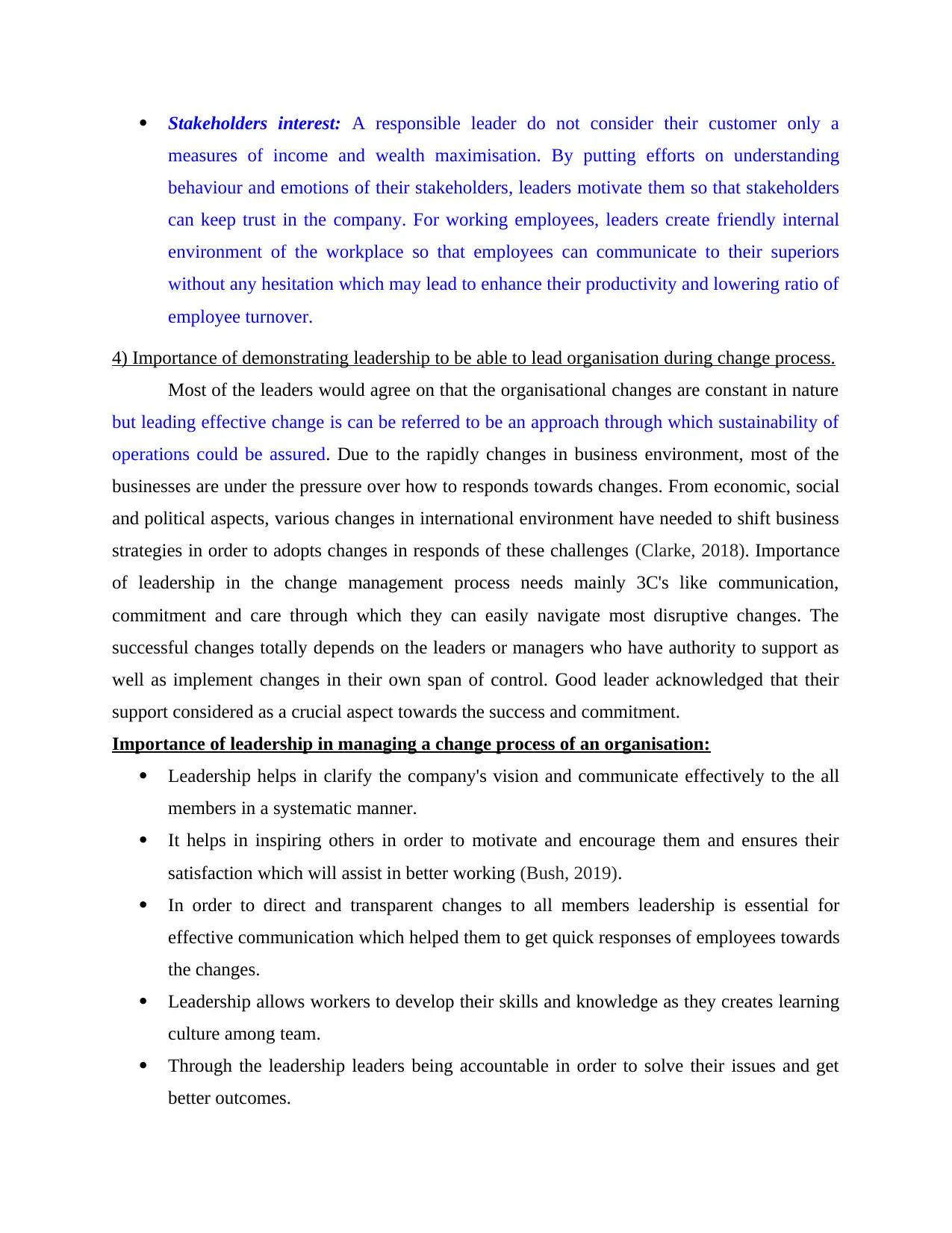
Stakeholders interest: A responsible leader do not consider their customer only a
measures of income and wealth maximisation. By putting efforts on understanding
behaviour and emotions of their stakeholders, leaders motivate them so that stakeholders
can keep trust in the company. For working employees, leaders create friendly internal
environment of the workplace so that employees can communicate to their superiors
without any hesitation which may lead to enhance their productivity and lowering ratio of
employee turnover.
4) Importance of demonstrating leadership to be able to lead organisation during change process.
Most of the leaders would agree on that the organisational changes are constant in nature
but leading effective change is can be referred to be an approach through which sustainability of
operations could be assured. Due to the rapidly changes in business environment, most of the
businesses are under the pressure over how to responds towards changes. From economic, social
and political aspects, various changes in international environment have needed to shift business
strategies in order to adopts changes in responds of these challenges (Clarke, 2018). Importance
of leadership in the change management process needs mainly 3C's like communication,
commitment and care through which they can easily navigate most disruptive changes. The
successful changes totally depends on the leaders or managers who have authority to support as
well as implement changes in their own span of control. Good leader acknowledged that their
support considered as a crucial aspect towards the success and commitment.
Importance of leadership in managing a change process of an organisation:
Leadership helps in clarify the company's vision and communicate effectively to the all
members in a systematic manner.
It helps in inspiring others in order to motivate and encourage them and ensures their
satisfaction which will assist in better working (Bush, 2019).
In order to direct and transparent changes to all members leadership is essential for
effective communication which helped them to get quick responses of employees towards
the changes.
Leadership allows workers to develop their skills and knowledge as they creates learning
culture among team.
Through the leadership leaders being accountable in order to solve their issues and get
better outcomes.
measures of income and wealth maximisation. By putting efforts on understanding
behaviour and emotions of their stakeholders, leaders motivate them so that stakeholders
can keep trust in the company. For working employees, leaders create friendly internal
environment of the workplace so that employees can communicate to their superiors
without any hesitation which may lead to enhance their productivity and lowering ratio of
employee turnover.
4) Importance of demonstrating leadership to be able to lead organisation during change process.
Most of the leaders would agree on that the organisational changes are constant in nature
but leading effective change is can be referred to be an approach through which sustainability of
operations could be assured. Due to the rapidly changes in business environment, most of the
businesses are under the pressure over how to responds towards changes. From economic, social
and political aspects, various changes in international environment have needed to shift business
strategies in order to adopts changes in responds of these challenges (Clarke, 2018). Importance
of leadership in the change management process needs mainly 3C's like communication,
commitment and care through which they can easily navigate most disruptive changes. The
successful changes totally depends on the leaders or managers who have authority to support as
well as implement changes in their own span of control. Good leader acknowledged that their
support considered as a crucial aspect towards the success and commitment.
Importance of leadership in managing a change process of an organisation:
Leadership helps in clarify the company's vision and communicate effectively to the all
members in a systematic manner.
It helps in inspiring others in order to motivate and encourage them and ensures their
satisfaction which will assist in better working (Bush, 2019).
In order to direct and transparent changes to all members leadership is essential for
effective communication which helped them to get quick responses of employees towards
the changes.
Leadership allows workers to develop their skills and knowledge as they creates learning
culture among team.
Through the leadership leaders being accountable in order to solve their issues and get
better outcomes.
Paraphrase This Document
Need a fresh take? Get an instant paraphrase of this document with our AI Paraphraser
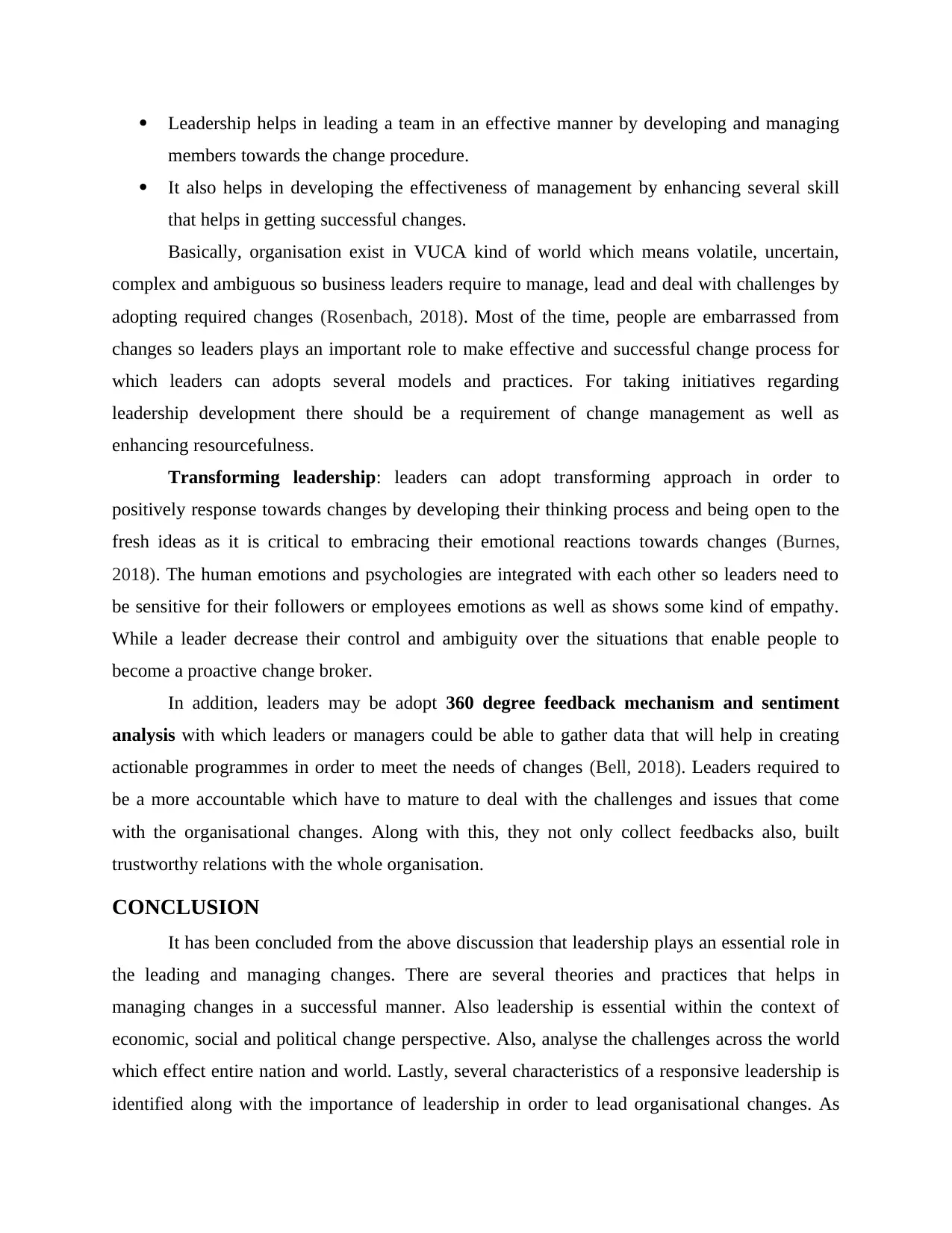
Leadership helps in leading a team in an effective manner by developing and managing
members towards the change procedure.
It also helps in developing the effectiveness of management by enhancing several skill
that helps in getting successful changes.
Basically, organisation exist in VUCA kind of world which means volatile, uncertain,
complex and ambiguous so business leaders require to manage, lead and deal with challenges by
adopting required changes (Rosenbach, 2018). Most of the time, people are embarrassed from
changes so leaders plays an important role to make effective and successful change process for
which leaders can adopts several models and practices. For taking initiatives regarding
leadership development there should be a requirement of change management as well as
enhancing resourcefulness.
Transforming leadership: leaders can adopt transforming approach in order to
positively response towards changes by developing their thinking process and being open to the
fresh ideas as it is critical to embracing their emotional reactions towards changes (Burnes,
2018). The human emotions and psychologies are integrated with each other so leaders need to
be sensitive for their followers or employees emotions as well as shows some kind of empathy.
While a leader decrease their control and ambiguity over the situations that enable people to
become a proactive change broker.
In addition, leaders may be adopt 360 degree feedback mechanism and sentiment
analysis with which leaders or managers could be able to gather data that will help in creating
actionable programmes in order to meet the needs of changes (Bell, 2018). Leaders required to
be a more accountable which have to mature to deal with the challenges and issues that come
with the organisational changes. Along with this, they not only collect feedbacks also, built
trustworthy relations with the whole organisation.
CONCLUSION
It has been concluded from the above discussion that leadership plays an essential role in
the leading and managing changes. There are several theories and practices that helps in
managing changes in a successful manner. Also leadership is essential within the context of
economic, social and political change perspective. Also, analyse the challenges across the world
which effect entire nation and world. Lastly, several characteristics of a responsive leadership is
identified along with the importance of leadership in order to lead organisational changes. As
members towards the change procedure.
It also helps in developing the effectiveness of management by enhancing several skill
that helps in getting successful changes.
Basically, organisation exist in VUCA kind of world which means volatile, uncertain,
complex and ambiguous so business leaders require to manage, lead and deal with challenges by
adopting required changes (Rosenbach, 2018). Most of the time, people are embarrassed from
changes so leaders plays an important role to make effective and successful change process for
which leaders can adopts several models and practices. For taking initiatives regarding
leadership development there should be a requirement of change management as well as
enhancing resourcefulness.
Transforming leadership: leaders can adopt transforming approach in order to
positively response towards changes by developing their thinking process and being open to the
fresh ideas as it is critical to embracing their emotional reactions towards changes (Burnes,
2018). The human emotions and psychologies are integrated with each other so leaders need to
be sensitive for their followers or employees emotions as well as shows some kind of empathy.
While a leader decrease their control and ambiguity over the situations that enable people to
become a proactive change broker.
In addition, leaders may be adopt 360 degree feedback mechanism and sentiment
analysis with which leaders or managers could be able to gather data that will help in creating
actionable programmes in order to meet the needs of changes (Bell, 2018). Leaders required to
be a more accountable which have to mature to deal with the challenges and issues that come
with the organisational changes. Along with this, they not only collect feedbacks also, built
trustworthy relations with the whole organisation.
CONCLUSION
It has been concluded from the above discussion that leadership plays an essential role in
the leading and managing changes. There are several theories and practices that helps in
managing changes in a successful manner. Also leadership is essential within the context of
economic, social and political change perspective. Also, analyse the challenges across the world
which effect entire nation and world. Lastly, several characteristics of a responsive leadership is
identified along with the importance of leadership in order to lead organisational changes. As
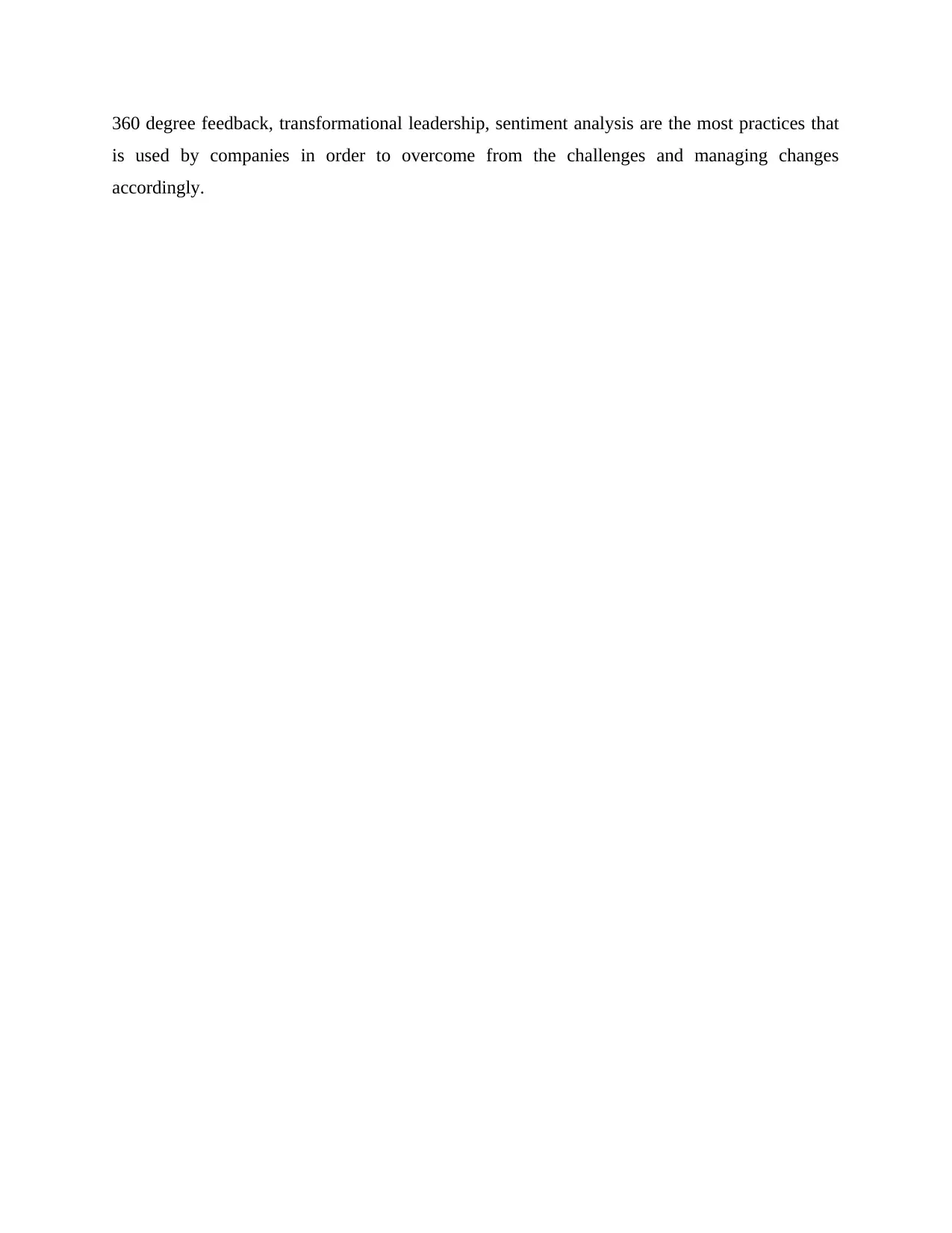
360 degree feedback, transformational leadership, sentiment analysis are the most practices that
is used by companies in order to overcome from the challenges and managing changes
accordingly.
is used by companies in order to overcome from the challenges and managing changes
accordingly.
⊘ This is a preview!⊘
Do you want full access?
Subscribe today to unlock all pages.

Trusted by 1+ million students worldwide
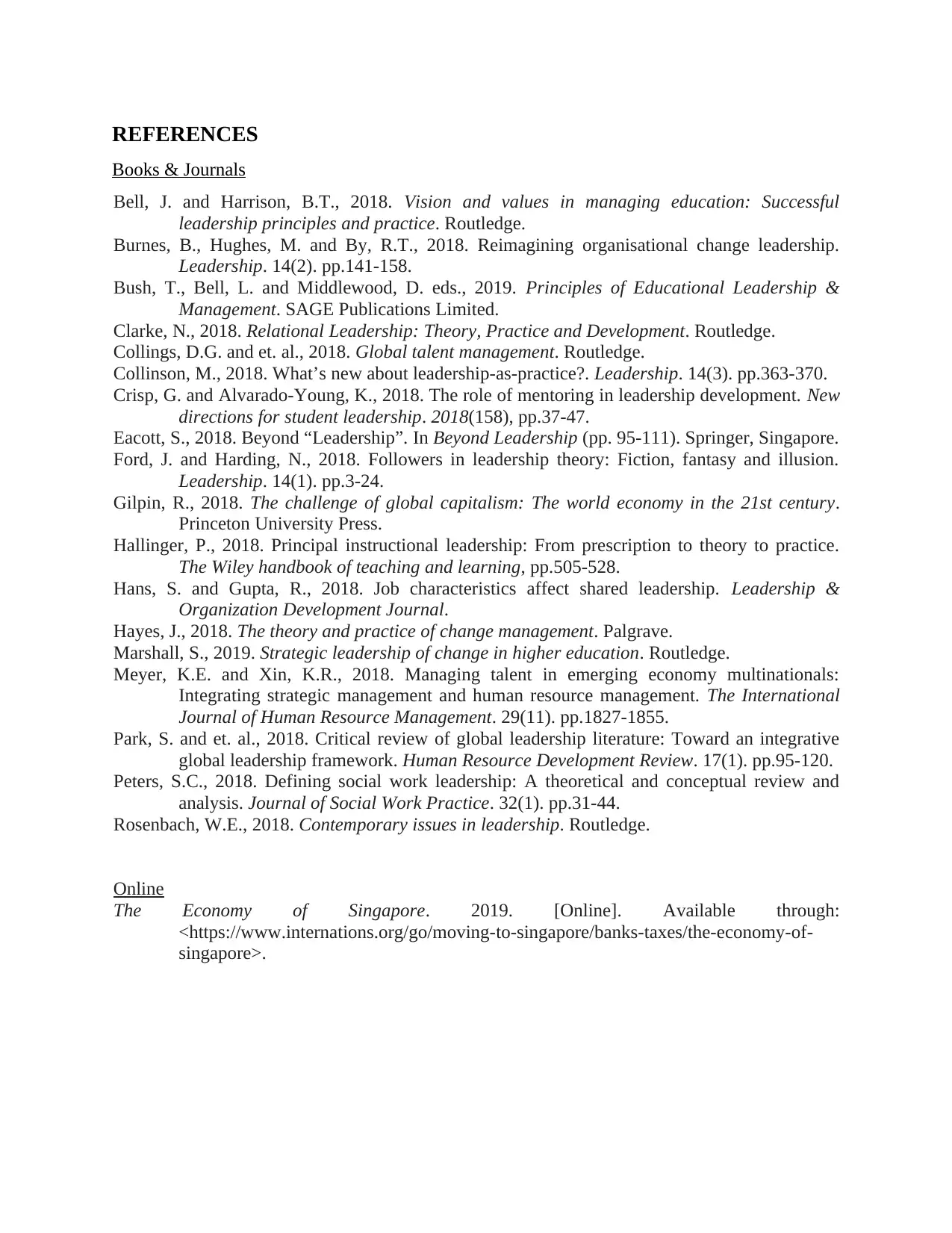
REFERENCES
Books & Journals
Bell, J. and Harrison, B.T., 2018. Vision and values in managing education: Successful
leadership principles and practice. Routledge.
Burnes, B., Hughes, M. and By, R.T., 2018. Reimagining organisational change leadership.
Leadership. 14(2). pp.141-158.
Bush, T., Bell, L. and Middlewood, D. eds., 2019. Principles of Educational Leadership &
Management. SAGE Publications Limited.
Clarke, N., 2018. Relational Leadership: Theory, Practice and Development. Routledge.
Collings, D.G. and et. al., 2018. Global talent management. Routledge.
Collinson, M., 2018. What’s new about leadership-as-practice?. Leadership. 14(3). pp.363-370.
Crisp, G. and Alvarado‐Young, K., 2018. The role of mentoring in leadership development. New
directions for student leadership. 2018(158), pp.37-47.
Eacott, S., 2018. Beyond “Leadership”. In Beyond Leadership (pp. 95-111). Springer, Singapore.
Ford, J. and Harding, N., 2018. Followers in leadership theory: Fiction, fantasy and illusion.
Leadership. 14(1). pp.3-24.
Gilpin, R., 2018. The challenge of global capitalism: The world economy in the 21st century.
Princeton University Press.
Hallinger, P., 2018. Principal instructional leadership: From prescription to theory to practice.
The Wiley handbook of teaching and learning, pp.505-528.
Hans, S. and Gupta, R., 2018. Job characteristics affect shared leadership. Leadership &
Organization Development Journal.
Hayes, J., 2018. The theory and practice of change management. Palgrave.
Marshall, S., 2019. Strategic leadership of change in higher education. Routledge.
Meyer, K.E. and Xin, K.R., 2018. Managing talent in emerging economy multinationals:
Integrating strategic management and human resource management. The International
Journal of Human Resource Management. 29(11). pp.1827-1855.
Park, S. and et. al., 2018. Critical review of global leadership literature: Toward an integrative
global leadership framework. Human Resource Development Review. 17(1). pp.95-120.
Peters, S.C., 2018. Defining social work leadership: A theoretical and conceptual review and
analysis. Journal of Social Work Practice. 32(1). pp.31-44.
Rosenbach, W.E., 2018. Contemporary issues in leadership. Routledge.
Online
The Economy of Singapore. 2019. [Online]. Available through:
<https://www.internations.org/go/moving-to-singapore/banks-taxes/the-economy-of-
singapore>.
Books & Journals
Bell, J. and Harrison, B.T., 2018. Vision and values in managing education: Successful
leadership principles and practice. Routledge.
Burnes, B., Hughes, M. and By, R.T., 2018. Reimagining organisational change leadership.
Leadership. 14(2). pp.141-158.
Bush, T., Bell, L. and Middlewood, D. eds., 2019. Principles of Educational Leadership &
Management. SAGE Publications Limited.
Clarke, N., 2018. Relational Leadership: Theory, Practice and Development. Routledge.
Collings, D.G. and et. al., 2018. Global talent management. Routledge.
Collinson, M., 2018. What’s new about leadership-as-practice?. Leadership. 14(3). pp.363-370.
Crisp, G. and Alvarado‐Young, K., 2018. The role of mentoring in leadership development. New
directions for student leadership. 2018(158), pp.37-47.
Eacott, S., 2018. Beyond “Leadership”. In Beyond Leadership (pp. 95-111). Springer, Singapore.
Ford, J. and Harding, N., 2018. Followers in leadership theory: Fiction, fantasy and illusion.
Leadership. 14(1). pp.3-24.
Gilpin, R., 2018. The challenge of global capitalism: The world economy in the 21st century.
Princeton University Press.
Hallinger, P., 2018. Principal instructional leadership: From prescription to theory to practice.
The Wiley handbook of teaching and learning, pp.505-528.
Hans, S. and Gupta, R., 2018. Job characteristics affect shared leadership. Leadership &
Organization Development Journal.
Hayes, J., 2018. The theory and practice of change management. Palgrave.
Marshall, S., 2019. Strategic leadership of change in higher education. Routledge.
Meyer, K.E. and Xin, K.R., 2018. Managing talent in emerging economy multinationals:
Integrating strategic management and human resource management. The International
Journal of Human Resource Management. 29(11). pp.1827-1855.
Park, S. and et. al., 2018. Critical review of global leadership literature: Toward an integrative
global leadership framework. Human Resource Development Review. 17(1). pp.95-120.
Peters, S.C., 2018. Defining social work leadership: A theoretical and conceptual review and
analysis. Journal of Social Work Practice. 32(1). pp.31-44.
Rosenbach, W.E., 2018. Contemporary issues in leadership. Routledge.
Online
The Economy of Singapore. 2019. [Online]. Available through:
<https://www.internations.org/go/moving-to-singapore/banks-taxes/the-economy-of-
singapore>.
1 out of 10
Related Documents
Your All-in-One AI-Powered Toolkit for Academic Success.
+13062052269
info@desklib.com
Available 24*7 on WhatsApp / Email
![[object Object]](/_next/static/media/star-bottom.7253800d.svg)
Unlock your academic potential
Copyright © 2020–2026 A2Z Services. All Rights Reserved. Developed and managed by ZUCOL.





